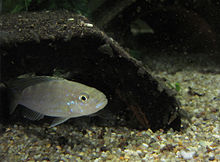Perissodus microlepis is a species of cichlid endemic to Lake Tanganyika. It can also be found in the aquarium trade.[2] This species reaches a length of 11 centimetres (4.3 in) TL. It is a scale-eating 'parasite' on other fish species. It occurs in two distinct morphological forms. One morph has mouth parts twisted to the left, enabling it to eat scales off its victim's right flank. In contrast, the other morph, whose mouth is twisted to the right, eats scales off its victim's left flank. The relative abundance of the two morphs in populations is regulated by frequency-dependent selection.[3][4][5][6]
-
Dorsal view of right-bending (left) and left-bending (right) mouth morphs[5]
-
Predation behaviour of a right-bending mouth morph[6]
| Perissodus microlepis | |
|---|---|

| |

| |
| Scientific classification | |
| Domain: | Eukaryota |
| Kingdom: | Animalia |
| Phylum: | Chordata |
| Class: | Actinopterygii |
| Order: | Cichliformes |
| Family: | Cichlidae |
| Genus: | Perissodus |
| Species: | P. microlepis
|
| Binomial name | |
| Perissodus microlepis Boulenger, 1898
| |
| Synonyms | |
| |
References
edit- ^ Bigirimana, C. (2006). "Perissodus microlepis". IUCN Red List of Threatened Species. 2006: e.T60649A12391511. doi:10.2305/IUCN.UK.2006.RLTS.T60649A12391511.en. Retrieved 17 November 2021.
- ^ Froese, Rainer; Pauly, Daniel (eds.). "Perissodus microlepis". FishBase. April 2013 version.
- ^ Hori, M. 1993. Frequency-dependent natural selection in the handedness of scale-eating cichlid fish. Science 260: 216–219.
- ^ Stewart, T. A. and Albertson, R. C. (2010) "Evolution of a unique predatory feeding apparatus: functional anatomy, development and a genetic locus for jaw laterality in Lake Tanganyika scale-eating cichlids" BMC Biology, 8 (1): 8. doi:10.1186/1741-7007-8-8
- ^ a b Lee, Hyuk Je; Kusche, Henrik; Meyer, Axel (2012) Handed foraging behavior in scale-eating cichlid fish : Its potential role in shaping morphological asymmetry. PLoS ONE 7: e44670. doi:10.1371/journal.pone.0044670
- ^ a b Takeuchi Y, Hori M, Oda Y. (2012) Lateralized kinematics of predation behavior in a Lake Tanganyika scale-eating cichlid fish. PLoS ONE 7: e29272. doi:10.1371/journal.pone.0029272
![Dorsal view of right-bending (left) and left-bending (right) mouth morphs[5]](http://upload.wikimedia.org/wikipedia/commons/thumb/d/d4/Dorsal_view_of_right-bending_and_left-bending_mouth_morphs_of_the_cichlid_Perissodus_microlepis_-_journal.pone.0044670.g001.png/212px-Dorsal_view_of_right-bending_and_left-bending_mouth_morphs_of_the_cichlid_Perissodus_microlepis_-_journal.pone.0044670.g001.png)
